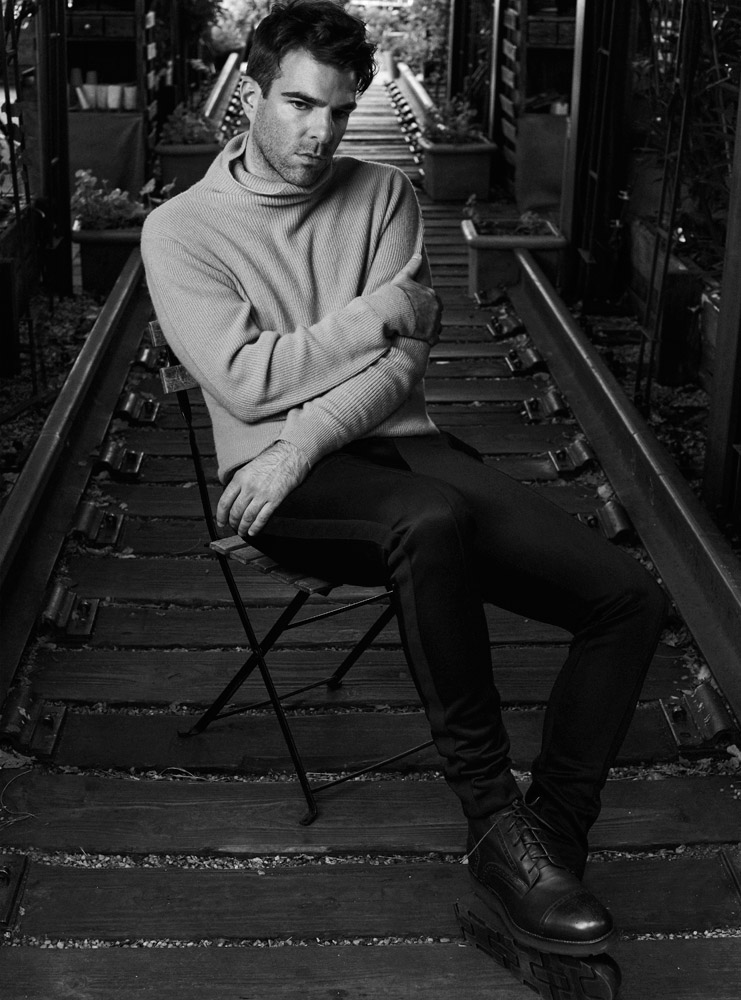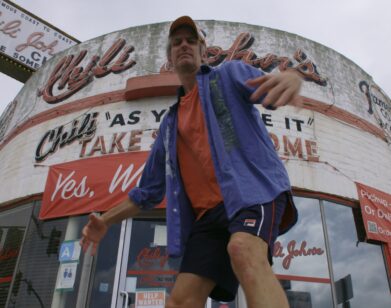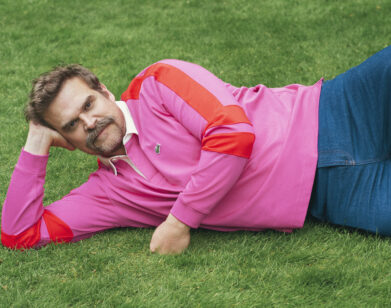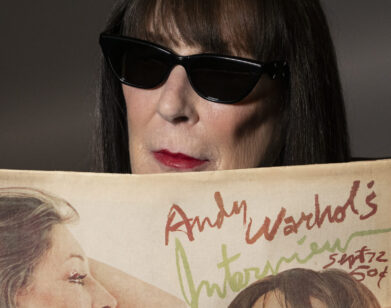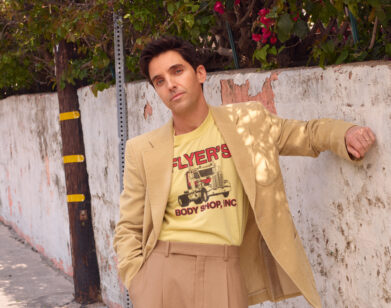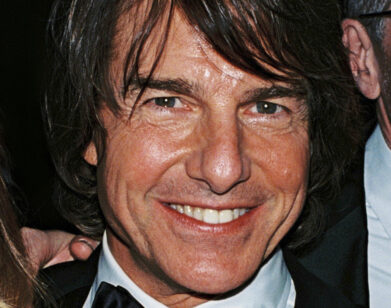Zachary Quinto
ZACHARY QUINTO AT GALLOW GREEN AT THE MCKITTRICK HOTEL, HOME OF SLEEP NO MORE, NEW YORK, SEPTEMBER 2016. PHOTOS: MICHAEL SCHWARTZ. STYLING: JOSHUA LIEBMAN/HONEY ARTISTS. GROOMING: SCOTT MCMAHAN/KATE RYAN INC. PHOTOGRAPHY ASSISTANT: DEAN PODMORE. DIGITAL TECHNICIAN: CHAD MEYER. PRODUCERS: STEVEN WILLIAMS/X2 PRODUCTION, CHRISTIAN MESHESHA/X2 PRODUCTION.
Your impression of Zachary Quinto probably depends on the first role you saw him play: Sylar, the serial killer in Heroes; Spock, the first officer of the Star Trek Enterprise; Peter Sullivan, the rocket-scientist-turned analyst that is too diligent for his own good in Margin Call; Chad Warwick, the new homeowner in American Horror Story: Murder House; Louis Ironson on stage in Angels in America. Born and raised in Pittsburgh, the Carnegie Mellon-trained actor has knack for picking memorable roles—or perhaps making them memorable—and his latest part is no different. In Oliver Stone‘s Snowden, which screened at the Toronto International Film Festival last week and is now out, the 39-year-old stars as real-life Guardian journalist Glenn Greenwald opposite Joseph Gordon-Levitt. “I think there’s a lot of tendency toward receptive thinking about Snowden himself and about this issue in general,” he explains over the phone. “Seeing the movie is a good genesis for a lot of discourse and debate about it.”
Over the weekend, Quinto spoke to his good friend and and fellow actor Patrick J. Adams. They reminisced about the first time they met and discussed how their careers have shifted as actors, Quinto’s production company Before the Door Films, and, of course, the politics of Snowden.
PATRICK J. ADAMS: Let’s talk about how you and I met. I have my memory of it, but I’m not entirely sure if it’s totally accurate. We were at the Ojai Playwrights Festival. We were both in The Laying on of Hands, correct?
ZACHARY QUINTO: Yes that is correct. I think we had known of each other before that, [but] that’s when we actually met.
ADAMS: I remember you were just about to go and do So Notorious on VH1, and I was super unemployed, and I think we spent a lot of time talking about how we weren’t particularly happy. I remember our conversations always being frustrated that we weren’t doing what we wanted to do, but also filled with the determination that we were going to overcome that. Do you remember it that way?
QUINTO: I definitely do. I remember standing outside of the dorm by the little terrace. I was going to do this job that I wasn’t 100 percent certain of, which ended up being much more fun than I expected. I remember you being in a particularly disillusioned place and really wanting your ambitions to be met with opportunity and not feeling like they were. It’s all the more reason that I feel grateful to be able to stay connected and be in each other’s lives. Obviously now you’re in a very different place, and it’s really nice to be able to look back on that and be reminded of how far we’ve come, at least in the opportunity aspect. The mental state aspect of it is a different story, I’m sure, but I always knew you would work.
ADAMS: I don’t know anything about how you came to do what you do. We’ve never really talked about childhood, or what drew you to theater, or whether that was born out of an introversion, or extroversion, or was this something in school you wanted to do. What made it happen for you?
QUINTO: I was definitely an extroverted personality at a young age and theater was an outlet for me to channel that energy. Also, my dad died when I was a kid, so I think it became a place for me to go where my mom knew that I was safe and taken care of and looked after. It served a dual purpose. It was definitely a place where I could get a lot of emotions out and have them constructively expressed, rather than destructively expressed.
ADAMS: Does it still feel like that kind of place for you? Do you carry that when you go to work still?
QUINTO: It feels that way when I’m doing a play, absolutely. On film and television, it’s more complicated than that I think, and when you start to add the business into the mix, and the industry into the mix, it doesn’t maintain it’s purity. That’s something that’s inevitable and unavoidable, but that’s why I try to do plays as much as I possibly can. There’s nothing so freeing as going to rehearsal and having that experience. Maybe it’s because it’s connected to my childhood, or it’s connected to the origins of what drove me creatively, but I feel like my life never makes more sense than when I’m in that process.
ADAMS: I totally agree. It makes sense that it’s so different from film and television, because it’s so in-depth. As actors, when we’re in film or television, we can have transcendent moments and we get to work with really creative and incredible people, but it’s such a small percentage of your time that’s about your process. There are so many other things you could be doing. When you get to the end of rehearsal, you get eight straight hours to just do what you’re allowed to do. I probably get eight straight hours of acting in an entire season or two seasons of Suits. It’s broken into such small pieces.
QUINTO: For sure.
ADAMS: How did you know you wanted to go to Carnegie Mellon?
QUINTO: I only auditioned at four schools. I started performing and studying when I was in middle school, and then as I got into high school, it just got more serious. I feel like it became more of a vocation. It became clear to me at that point that I wanted to pursue it. I went to high school directly across the street from Carnegie Mellon, actually, and I knew people that were a couple of years older than me that went there. I was able to see shows in the drama department, and hang out there little bit, and it just felt like a natural progression. It was at the top of my list. There was a little bit of hesitancy about staying in Pittsburgh and not moving away for college, but that didn’t last long. It was right in line with what I wanted, so I auditioned there and it wasn’t a tough decision. It was actually pretty cool to be in Pittsburgh for those four years. I moved into the dorms and had a pretty normal college experience, even though it was in my hometown. I really thrived there. I feel like it really suited me and served me well in terms of how I grew up there.
ADAMS: What was the moment for you when you went from hoping you could [act] to knowing it was going to be a vocation? Was it a particular play or person?
QUINTO: I went away to this summer program after my junior year of high school. They used to have this thing called the Governor’s School, and they had it for different disciplines—science, math, performing arts. I auditioned and I got accepted, and it was an eight-week program away from home. I went for acting. I was 15, and I turned 16 while I was there, so that was a seminal moment for me. It made me realize the life of it, the discipline of it, and the joy of that discipline, where it was all we did. There was no other concern; there was no other focus. It was simply there to learn and grow and perform, and that was pretty amazing and informative. I’d say that was a big pivotal moment for me. I came back and decided that I wanted to go to college for acting and got my family on board. My mom, who was a single mom, was a little reticent, but I think after that summer, she saw a shift in me and realized that it was something I wanted more than just a hobby.
ADAMS: I’ve seen you on stage now a few times, and it’s a thing to behold. You were so in love with the theater. What made you decide to make that move to Los Angeles? What made you decide to pursue film and television and to get in front of the camera?
QUINTO: Honestly, people told me to. It was weird, I graduated from school, I never thought I’d live in L.A. and I always wanted to be to New York. I assumed that would be my trajectory—that romantic ideal of moving there and doing plays Off-Broadway and being scrappy about it. Then we did a showcase in New York and a showcase in L.A., and for whatever reason the response that I generated in L.A. was significantly more enthusiastic. We did monologues and scenes, and New York I did a scene from Amadeus and a monologue from Pounding Nails in the Floor With My Forehead by Eric Bogosian, and then in L.A. I switched the scene to This is Our Youth and did the same monologue. I was spiky-haired, super skinny. A lot of people were like, “You should come here and do a sitcom.” That was the feedback that I got. Obviously it was quite a different journey than the one I’ve actually had, but I just listened to people. It worked out in the long run, but who’s to say what would have happened if I had trusted my instincts and moved to New York like I thought I would.
ADAMS: It seems like you got to move to New York on your own terms when the time came.
QUINTO: Yeah, that’s true. When I got out of school, it used to be that it was theater actors that ended up doing film and television, and you had to come from the theater to be taken seriously in that world. I think somewhere in the ’90s, it started to shift, and you started to see a lot of film and television actors doing theater, and producers using the notoriety of the film and television actors to sell tickets. I think it all happened the way it was meant to, certainly. My return to the theater in New York was so specific. I didn’t want it to be about leveraging my exposure or my fame, so the first show I did in New York was an ensemble piece at an Off-Broadway theater, and I wanted to make sure that it was just about the play and about the experience. The play I did on Broadway a couple of seasons ago started out of town and it moved its way into New York because of the experience that we had out of town.
ADAMS: Making it about the work.
QUINTO: Totally.
ADAMS: It’s funny that you did a monologue from Pounding Nails in the Floor With My Forehead. I did the same thing for my university when I went to USC. Do you remember your first job? What was the first job that they gave you that first paycheck for?
QUINTO: My first job was a show called The Others. I had, like, three lines. Julianne Nicholson was in it, and Gabriel [Macht]. I remember Gabriel wasn’t there the day I was, but he sent a note, because he went to Carnegie Mellon as well, so we knew each other a little bit through that, and he was so sweet and generous. It was meant to be a recurring role that would evolve on the show, but the show only lasted a little while and I ended up only doing that one episode. I remember having to hit a mark and having no idea how to do it, real childlike stuff, because Carnegie didn’t do an extensive job preparing us for film and television. It was very much a theater program. That was my first job. It was cool. I was glad it was.
ADAMS: How long did it take you to figure out how to take all of your training of being on stage, and [adapt it to] hitting your marks and doing these alien things? Was it fun for you to figure out how to still do your job and practice your craft in an environment where it was a little bit more challenging?
QUINTO: I think I integrated that over the first couple of years that I was out of school, mostly in auditions, to be honest. I loved auditioning because it was just an opportunity to act. Whether or not I got the job was the next hurdle, but the idea that I would get to act that day was the thing that excited me the most about it. I had to learn how to modulate my performances and interpretations of these roles in auditions for the camera. I would say auditioning was my real training ground. The technical aspects—like hitting marks and pacing yourself and preparing and dealing with the downtime—the first recurring role I had on 24 was probably the way I learned that stuff.
ADAMS: You’re fortunate enough to enjoy a really high level of success where people are starting to offer you jobs. For someone who loves auditioning so much—and I agree with you that it’s the place where you can test it out with the people you might get to work with—is it any different? Do you miss the opportunity to get in a room and work on it before you know if you’re going to do it? It must be a whole different muscle to figure out if the project is something you want to work on without having gone through that process.
QUINTO: I miss it very much, actually. This has been something I’ve been asking to do more of. I also feel like the kinds of jobs I want right now—I consider them aspirational. I want to raise the bar for myself, and I am in this interesting spot where I do get offered a lot of things, but frankly, the majority of the things I get offered I’m not really interested in doing. I want to do the things that I have to fight for. I want to be working with directors who are at the top of their game. I want to be raising the bar for myself, and to me, the best way to do that is to prove to them that I’m the best for this job. I’ve been looking for ways to audition more, because it also keeps me sharp and keeps my ambition at its firm edge. That’s something that I’m actively engaged in conversations about now with my reps: What’s out there that I can really either put myself on tape for, or meet with the director for and read for? How do we do that? We’re now at the end of the Star Trek reboot trilogies and whether we are going to do another movie remains to be seen, and so I feel like I’m at the end of this cycle that began with me coming out of school and auditioning and building my way up. Heroes and Star Trek were 2006 and 2007, and I was just about to turn 30, and everything changed. I found myself on this amazing journey, which continues, but it’s now at a natural transition point. I’m reevaluating and reexamining how and where I go from here.
ADAMS: I remember the day you told me that it looked like Trek was going to happen, and we just couldn’t believe how your life was going to change. Most people look back on that and wait for the roles to come in, and instead you did something that a few people do, but not very successfully, which was to start your own production company [Before the Door Pictures]. The guys you started it with went to Carnegie Mellon, right?
QUINTO: Yeah, I actually met one of my business partners [Neal Dodson] at the Governor’s School summer program, so we’ve known each other since we were 15 and 16 years old, and we both ended up at Carnegie Mellon together. He started working for a producer out of school after a few years, and then we started the company together.
ADAMS: Did you guys always know from a young age that you wanted to be making stuff together?
QUINTO: No. I had just gotten Heroes, and I had just found out that I was going to be doing Trek, and I thought it was probably a good idea for me to create an infrastructure that would allow me to do my own work and put my stuff into the world. He had been working for this producer for about three or four years at that time, and he wasn’t particularly happy and I thought this was a good moment for him to get out of there and do his own thing. He was the first person that I approached about it. I knew I couldn’t do it on my own. I knew I needed a partner. I needed someone who could focus on and spearhead the business side of things, and he was great at that. That’s how it started. Our third partner was this other guy called Corey [Moosa], and he came in with good ideas and also some access to money, and so we joined forces and drew up a business plan and got financing for the beginnings of the company. We had no idea what we were doing really. We just started looking through material and started producing our own stuff.
ADAMS: Was there a mission statement for the company?
QUINTO: Yeah, we spent a lot of time writing, for lack of a better word, this manifesto about what we wanted to do. We wanted to find work that was relevant socially and that didn’t take audiences for granted. We wanted to draw people in with a dialogue—whether it’s a creative process or a social issue or innovation of some kind; whether it was how we told the stories or what stories we told. We produced some online videos. We were constantly looking for features and looking for ways to get involved with people who were making stuff.
ADAMS: I remember when you started talking about Margin Call, which was the first feature you guys made, and being so excited to have found J.C. [Chandor], and being able to give a platform to somebody who you really believed in.
QUINTO: Yeah. It just so happened that J.C. was a first-time feature director, and his script was exactly the kind of thing we were looking for. He was the kind of energy we were looking for, so we decided to get behind it with all of our effort. That was the beginning of our relationship with first-time feature directors, and that’s when it became really important to us, watching them thrive and grow in a creative environment in which you can do that was really key. Also his work checked all the boxes, because it was socially relevant and intellectually driven, and creatively exciting. There was a lot happening with that script, and I don’t think all of us could have imagined how successful an experience it would be, both creatively and later commercially. It was an incredible time.
ADAMS: Can we talk about Snowden for a second? As far as I know, it’s the first time you play somebody who is a real character in the world.
QUINTO: Yeah, I think that’s probably right. Certainly, in any capacity like this it is. I play Glenn Greenwald.
ADAMS: You met Glenn before, but you didn’t meet him for the film, right?
QUINTO: Right. I met Glenn briefly in 2009. We were both guests on Real Time With Bill Maher. I was the show’s guest and he was on the panel. But this was before the Snowden stuff happened. I didn’t have the opportunity to meet him in preparation for the movie, unfortunately, for various reasons. But I was able to dive into the main articles he’s written, and interviews with him, and just the function that the character serves in the movie, that was enough for me. If it was a biopic about him, I would have immersed myself more fully in his personal life and gotten to know him as much as I could, but because it was much more about his relationship to this particular situation, to The Guardian, to Laura Poitras, and to Ewen MacAskill, and Edward Snowden, I was able to really learn a lot about him from reading his book and reading his many articles and accounts of that time.
ADAMS: Did your opinion of the entire story change dramatically from being somebody who was probably just following it like the rest of us—reading it on a daily basis in the newspaper—to actually diving in and hearing different perspectives?
QUINTO: It certainly woke me up to how vulnerable we all are. I think I was much more cavalier about it before I started working on the movie, and then the more I read the documents themselves and saw just how sweeping and indiscriminate the intrusions into our privacy have been, it made me more aware. That was probably for the better, I guess. It didn’t really change my opinion about Snowden all that much, but I definitely feel like as a culture, it gave us information that generated a responsibility to protect ourselves as much as we can and also a responsibility to hold our government accountable to honoring our constitutional rights. That’s something that I feel more committed to now than I was a couple of years ago. People always ask me what I think, if he’s a hero, if he’s a villain. I don’t really tend to moralize it so much as I feel like he’s a whistleblower. He’s someone who saw a wrongdoing and in order to shine a light on that wrongdoing had to bend some rules and break some laws along the way. Even the former Attorney General of the United States Eric Holder has come out to say that he believed that Snowden performed a public service, and I couldn’t agree more. What we do with the information now is up to us, but certainly I have a lot of respect for the courage and integrity that was required for him to take that action.
ADAMS: What’s it like doing press for a film like this? This is probably your most political film in a sense. I mean, Oliver Stone in general, and then the subject matter that has yet to be resolved and everybody is figuring out where they stand. Do you get a lot of great questions that are hard to answer, or do you get a lot people who want you to moralize it and make it one thing or the other?
QUINTO: I’d say it’s somewhere in between. I’ve had some pretty stimulating conversations about where we are politically as a result of this movie, but then there are a lot of questions just about that sensationalism of it. It’s a very complicated landscape and I don’t think there’s one easy answer about it. He has said many times that he’s willing to come back and face trial if he can be guaranteed a fair trial, but the likelihood of that is so slim. They’re mounting a campaign right now with the ACLU and a lot of different organizations advocating for his pardoning before Obama leaves office. Wouldn’t it be incredible to see something like that happen? I don’t know what we can expect. I am interested in the different points and perspectives that people have.
ADAMS: How did you feel about Citizenfour? I just got to catch that a little while ago. I was so moved by that. She’s incredible, Laura Poitras.
QUINTO: I know. I found it was remarkable. It was so evocative. I feel like it captured the urgency and the chaos, but through the silence of it, through the slowness of it. That’s what I loved the most about it. While we were shooting the movie, we shot in the actual hotel in Hong Kong where it all went down, the Mira Hotel. Laura Poitras was coming to Hong Kong to do a screening of Citizenfour, and she ended up staying at the Mira Hotel. It was her first time back in Hong Kong, and I ran into her in the elevator. Literally I had just finished shooting one day, and I came back to the hotel and she was in the elevator. We ended up having a conversation and then the next day Joseph Gordon-Levitt ran into her as well. We all got together and spent a little bit of time with her, which was pretty remarkable. I have a lot of respect for her, for sure.
ADAMS: She’s an incredible woman. I’ve known you for a long time, Zach, and I feel like every time we talk about something that’s on the horizon, there’s something to it being connected in some way to the flow of your own life and to your journey. Is that something you’re always searching for? Obviously there are parts that we take for all sorts of other reasons—it’s a great job, or a window opens up and it can just be fun to do. But it seems like your work needs to be very personal to you. With Star Trek, some people could say that that’s a big, fun sci-fi movie, but I know that your relationship with Leonard [Nimoy] and your relationship to that role and what you wanted to do with it was very, very personal to you. Are you really always on the hunt for what’s going to serve you in your personal journey and what’s going on with you at the moment?
QUINTO: I hope so. I think the goal is always to go deeper within myself, and accept myself on deeper levels and to know myself on deeper levels. Whether or not I look for roles that are going to do that for me, I certainly look for the ways in which the roles I get can do that for me. My relationship with Leonard was a byproduct of playing Spock that I never would have imagined, but the more I got to know him, the more I realized, there are no mistakes. I’m playing this role for very specific reasons, and maybe those reasons have to do with where I am creatively in my life, but maybe they have to do with where I am personally in my life. Leonard was such a teacher for me. He was one of the most fully realized human beings I have ever known on every level—in his personal life with his personal relationships and his love for his wife and his evolution with his family. Then as an artist, as an actor, as a writer, as a poet, and as a photographer. He never stopped. I feel like that’s a prime example of, yeah, I got that role and it was awesome, because it changed a lot for me professionally, but then creatively, it became a whole other thing, with J.J. [Abrams] and Chris [Pine] and the people I got to know. Now I just feel like it’s our jobs to be open and to keep moving stuff forward. I don’t know what that means. This is the first time in a long time that I have no idea what’s happening next. As scary as that is, and as anxiety-provoking as that can still be, it’s also really exciting.
SNOWDEN IS OUT NOW. PATRICK J. ADAMS IS AN ACTOR, PRODUCER, AND DIRECTOR, WHO CURRENTLY STARS ON USA’S SUITS AND THE CW’S LEGENDS OF TOMORROW.

